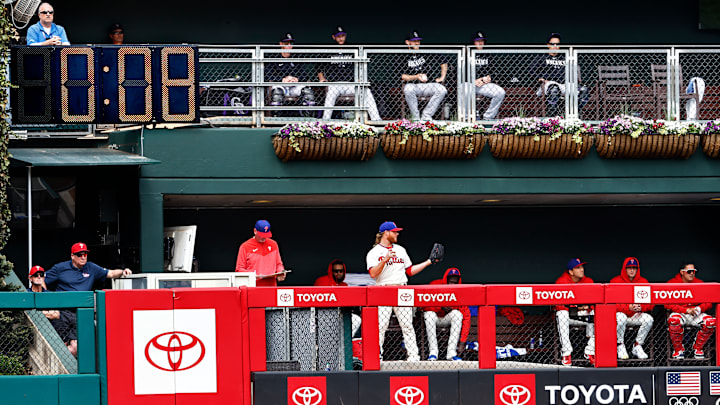After his last start, Aaron Nola made a reference to the pitch clock being faster in Philadelphia than it is in other stadiums around Major League Baseball.
Coming off his outstanding outing, Aaron Nola had some thoughts on the pitch clock: pic.twitter.com/VlI5IkLa93
— NBC Sports Philadelphia (@NBCSPhilly) June 6, 2023
Upon Nola making these comments, The Athletics' Matt Gelb published an article that backs up ($) Nola's comments. In short, Gelb's article indicates that there has been a significantly higher number of pitch clock violations at Citizen's Bank Park than in other parks around baseball. Players other than Nola seem to be taking notice as well.
Starting pitcher Taijuan Walker commented on the pace of the pitch clock in Philadelphia:
"We come home and it’s the fastest in the league. We were just on the road for two weeks, and then we come home and speed everything up."via Matt Gelb/ The Athletic
From the article it appears that both Phillies players and visiting players share similar sentiments regarding the pitch clock operation in Philadelphia. The interesting part of the whole pitch clock conspiracy theory is that the clubs around the league do not have their own pitch clock operators.
Pitch clocks in Major League Baseball are operated by Field Timing Coordinators (FTCs). Like umpire crews, FTCs are assigned to a series and are employed by Major League Baseball. This means that it is not the Phillies who are controlling the pitch clock, but an FTC assigned by the league.
As it is still early in the season it is possible that these numbers are just anomalies at this point. There is no reason to believe that the commissioner's office would be purposely asking to speed up the timer in some parks but not others.
Does a faster pitch timer favor the home team?
Are the Phillies really benefiting from the pitch timer being faster at home? While during Nola's most recent start the Phillies were on the positive end of the violations, that is not always the case. Gelb points out that only five of the 25 timer violations have gone against visiting pitchers at Citizen's Bank Park.
A faster timer does not necessarily benefit either team, but it could certainly throw both teams off of their rhythm— especially if they are coming off of a long road trip. It really depends on the hitter or the pitcher to determine if a faster or slower clock is more beneficial. For pitchers, a faster clock means that they have to work more quickly which could result in earlier fatigue. For hitters, they may have a routine as they approach the box and have an internal clock that could be rushed or slowed by inconsistencies in pitch timers around the league.
How can MLB regulate pitch timers?
The NFL, NBA, and NHL all have had clocks since their inception. It is part of the game that everyone is used to and understands. MLB has never had a clock that held this much importance in its vast history. There is bound to be some issues at times as the league incorporates new rules into the game.
In the NFL, NBA, and NHL, clocks can be reset after reviews— not always a review of the clock, but because of challenges or other plays that cause the clock to be reset. The point of the pitch timer in baseball is to speed up the game, not keep track of how much time is left. Offering challenges to pitch timer violations would be counterintuitive to the purpose of the timers.
A likely fix is just allowing the FTCs to get used to the pitch timers and when to start the clocks. If you have ever been lucky enough to get roped into running a rec league or CYO basketball game clock, you know that different clock operators start the clocks at different times (they are not getting paid, but you get the point). The FTCs seem to be in the same boat. There just needs to be more uniformity in when exactly the timer starts. As the players and league get used to the new rules, this is an issue that may just fix itself.
